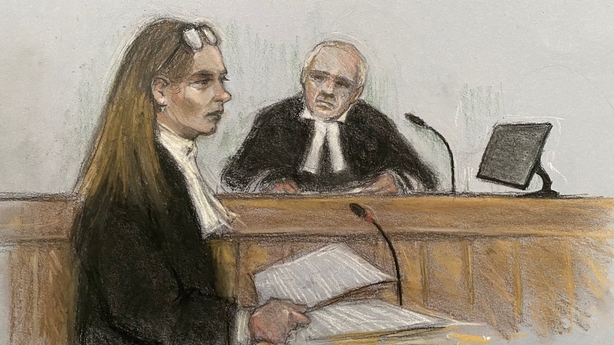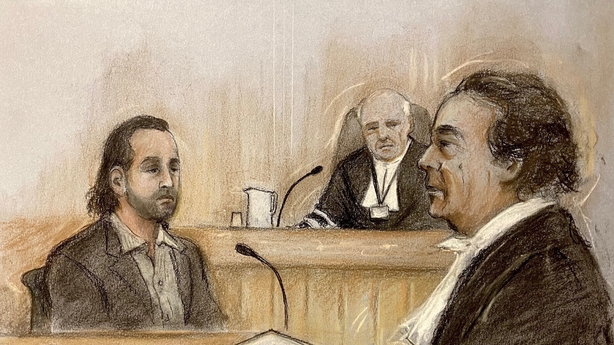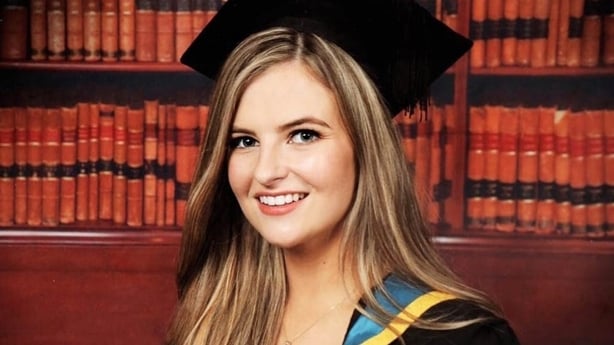Jozef Puska brutally killed Ashling Murphy, told contemptible lies and the evidence against him is overwhelming, the prosecution has told the jury in his trial.
However, lawyers for the defence have told the jurors that the evidence is not necessarily as clear and straightforward as the prosecution says.
The jury has now heard closing speeches from both sides in the case.
Mr Puska has pleaded not guilty to murdering Ms Murphy beside the Grand Canal in Tullamore on 12 January last year.
The jurors are expected to begin considering their verdict after Mr Justice Tony Hunt sums up the evidence and the law.
Prosecution
Prosecuting counsel Anne-Marie Lawlor said so much in this case was plain and obvious, and she hoped the jury would view the evidence in the same way.
She urged them not to be drawn into the weeds and not to be distracted. The evidence of Mr Puska's guilt was overwhelming, she said.
To start with, there was a confession. She said he confessed to the murder because that is what he did. He killed Ms Murphy in the way he told a garda he killed her - he cut her neck.
Ms Lawlor said it had never been suggested to any of the gardaí involved or to the interpreter that the words were not said.
The expert evidence about medication put to bed any suggestion that something was affecting an "unprompted, spontaneous, clear, detailed, unequivocal confession".
Ms Lawlor also told the jurors Mr Puska had lied on multiple occasions and she said he had fabricated a story for them and spun them an absolutely unequivocal structure of lies and mistruths, some of which were foully contemptible in their nature.
She said the lies affected Mr Puska’s credibility and reliability. The jurors had to ask themselves could they put any weight on the story Mr Puska had fixed on for court.
Ms Lawlor told the jury that Ms Murphy was an investigator in her own murder as she got the DNA of the person who killed her under her fingernails.

She said the evidence of eyewitness Jenna Stack was extraordinarily important as she had described Mr Puska holding down Ms Murphy in the bushes.
Ms Lawlor urged the jurors to use their basic common sense. She said she was conscious of giving credence to Mr Puska’s ludicrous, fabricated story. It was like being "through the looking glass of foolishness".
But she said the lies told by Mr Puska were not benign, they were contemptible. He was suggesting he was trying to save Ms Murphy’s life when that was patently not what was happening. She asked the jury to find Mr Puska guilty of murder.
Defence
Defence counsel Michael Bowman said the case had to be decided on the evidence and not on emotion, prejudice or sympathy.
What happened to Ms Murphy was without justification, barbaric and horrible, he said, and it was futile to suggest that sympathy should not lie with the Murphy family who had sat in court with such dignity, listening to the evidence.
But he said the legal principles were even more important in a case of this nature where people were naturally revulsed by the tragedy visited on the Murphy family.
He urged the jurors not to arrive at a position with a closed mind.
Mr Bowman said that key witness, Ms Stack, had formed the "mistaken impression" that Mr Puska was trying to hurt Ms Murphy and not help her based on the fact that she did not hear her call out for help.
He said Ms Stack had said she saw Ms Murphy’s legs kicking, but other witnesses who arrived at the scene had seen one of her legs elevated. And that may have been what Ms Stack had seen.
Mr Bowman said Ms Stack had formed an impression in 30 seconds, but he told the jurors they did not have that luxury.
He said Mr Puska’s interpretation was less likely, but also possible, that Ms Murphy understood she was being helped and was not calling out because she was not distressed to the extent alleged by Jenna Stack.
Mr Bowman cast doubt on the reliability of the data extracted from Ms Murphy's Fitbit. He said it was not to be relied on.
The prosecution was saying it was a rock solid foundation on which they could build their case, particularly in relation to timings. But he said there were questions about this material that had not been answered by the prosecution.
Mr Bowman said his client had heaped further suspicion on himself by his own actions. He left the scene instead of looking for help and went home "surreptitiously" with his friend. He had suggested his clothes should be destroyed.
But he asked why would a man who had had almost two years to make up a story as alleged by the prosecution mention the burning of his clothes, if he was an arch criminal who had spun a tapestry of lies.
He pointed to the evidence of Mr Puska’s friend Rostislav Pokuta, who had initially lied to gardaí about the last time he saw Mr Puska.
Mr Bowman said Mr Pokuta had lied because he was afraid his family and livelihood would be harmed due to the mood in Tullamore.

People lie for any number of reasons, he told the jury, not necessarily associated with guilt. He said the prosecution were taking a broad brushstroke approach but the jurors should be wary of doing that.
He told the jurors that Mr Puska was not following women on 12 January. However, even if they were satisfied that someone followed a girl around Tullamore, that should not be taken as evidence of murderous intent.
He said there was no evidence of any scratch marks on Mr Puska’s hands or face caused by Ms Murphy’s fingernails.
He warned them to be careful how they interpret the evidence as it is not necessarily as clear and straightforward as the prosecution said it was.
Mr Bowman pointed the jury towards evidence they had heard about an email sent to the Garda Press Office on 17 January, from a man who said he had killed Ashling Murphy.
The court heard he suffered from mental health issues and drank too much. He told gardaí he did not remember sending the email and was sorry.
Mr Bowman said the reliability of this man was accepted without equivocation and without further inquiries.
And yet, he said, when Mr Puska said he could not remember his engagement with gardaí in hospital, he was ridiculed.
He said defence expert Dr Johann Grundlingh's concerns over the reliability of Mr Puska’s confessions were not contingent only on the medication he had taken.
Other factors included his the unfamiliar environment he found himself in, his recent surgery, and the language barrier.
He said Dr Grundlingh had 20 years’ experience seeing around 1,000 patients year. He said subtle delirium caused by surgery was a real thing that the doctor had observed in his clinical practice.

Mr Bowman said these things must be considered until they are excluded after an assessment.
If you do not speak the language and are not with people who know you, how would anyone pick up that you are behaving abnormally, Mr Bowman asked.
The simplest way to have avoided all this would have been for gardaí to have engaged with a doctor, Mr Bowman said.
He said the jurors were possessed of the greatest engine to get to the bottom of this – their collective common sense.
He said what he had said should cause them to pause on each occasion that the prosecution invited them to move forward and be satisfied with something beyond reasonable doubt.
Mr Bowman said Mr Puska had done no more than anyone else who was at the scene looking to help Ms Murphy on the day in question.
He did no more than anyone would do in those circumstances, he said, but what he had done afterwards had cast him in a light of suspicion which left him before the courts.
Mr Bowman asked the jury could what Mr Puska said reasonably be true. They did not have to be convinced he said.
He said upon a cold, analytical parsing, analysing and stress testing of the evidence they could not bring in a verdict of guilty. He said the evidence was entirely a matter for them.
Mr Bowman asked them not to bring in a verdict that did not accord with common sense, or a verdict which was an affront to the reality in the case.
He asked them to bring in a verdict in accordance with the evidence.
Judge addresses jury
The jurors were then addressed by trial judge Mr Justice Tony Hunt.
He told them their verdict was unimpeachable and would be good for all time and he reminded them of some of the principles they have to apply.
The judge said the presumption of innocence applies to Mr Puska all the way through the process and can only be set aside if they are satisfied the prosecution has proved its case beyond a reasonable doubt.
He told them they were being asked to make a most fundamental and consequential decision, but the consequences were not their concern.
Because the decision they had to make was so important, it had to be made to a high standard of beyond reasonable doubt. He said this was not proof to mathematical certainty and was not an impossible standard.
The judge said Mr Puska had given evidence, but that did not mean he had to prove anything.
He advised them to look at the reasonableness of a witness's testimony in light of all the evidence and their experience.
At the end of the day, he said the jury needed to make a considered decision about what happened in the ditch on Grand Canal way on that January afternoon.
"That is what the case comes down to," Mr Justice Hunt said.
The case was very stark, he said. The prosecution had one view and the defence had another.
To convict Mr Puska the jurors had to be satisfied the version of events urged on them by the prosecution had been proved to their satisfaction beyond a reasonable doubt and that no other reasonable possible alternative was available to them.
If they considered Mr Puska’s version reasonably possible, he said they had an obligation to acquit.
He will continue his address to the jurors on Wednesday after which they are expected to begin considering their verdict.






